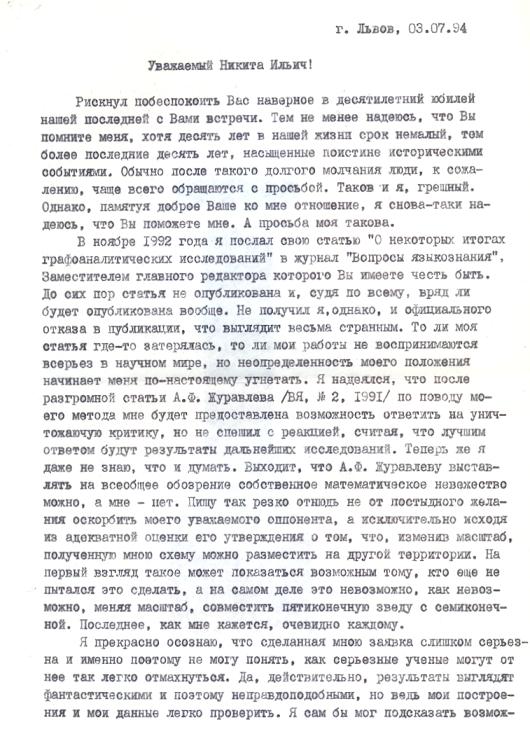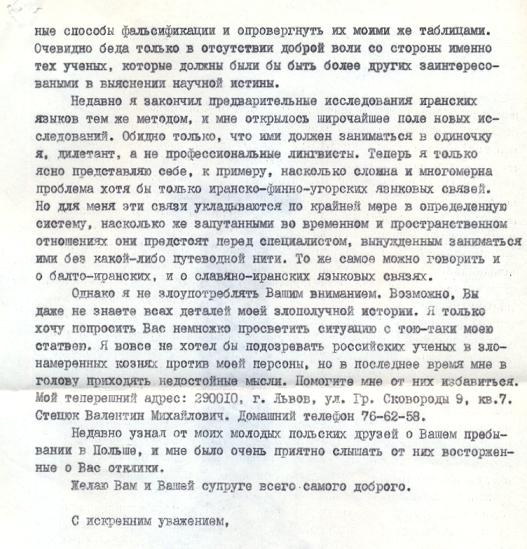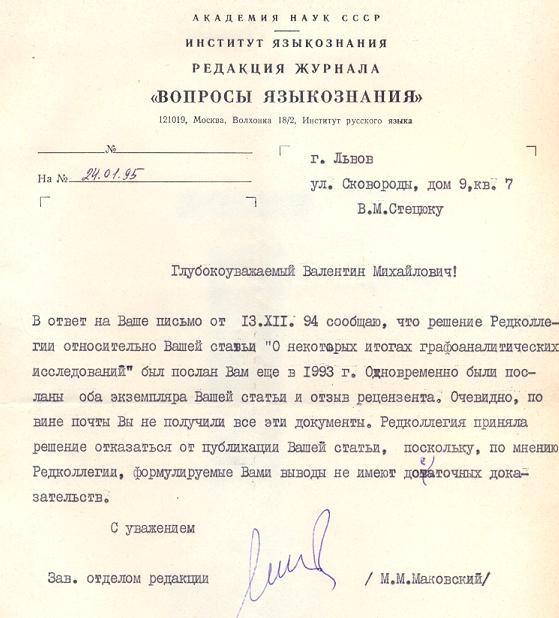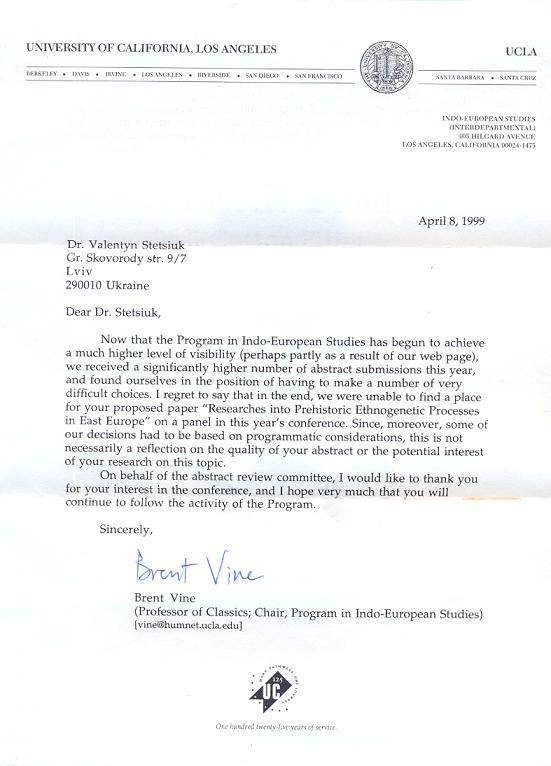An Independent Reseacher' s Trying Experience History. Part 2.
So I sent my new article to the "Problems of Linguistics". I had no reply for over a year and then I went directly to N.I. Tolstoy, who has become then a chief editor of this magazine. By the time I read Zhuravlev's article, which made a depressing effect on me. From the text, it is clear that he did not understand my method on the whole and at the same time exquisitely insulted me. To this I did not pay much attention to these insults but writing to Tolstoy I pointed out that the criticaster had no knowledge in elementary mathematics. Next, I quote the text of my letter in full.


At the same time I wrote a letter also to O.S. Melnychuk wording, by the way, critical attitude to the state of Ukrainian science. Perhaps this is why, maybe because his wife had already died, and he did not feel healthy enough to share my with me my grades, I become no response. I wrote Melnychuk that I sent in November 1992 to journal "Problems of linguistics" an article in which I, based on a graphical model of the Indo-European, Finno-Ugric, and Turkic languages, have placed the territories of their speakers in Eastern Europe. Further, a part of the letter to Melnychuk am applying in English translation:
In 1985, I returned to Ukraine with the hope to find understanding in the Ukrainian scientific circles. The grounds for such hopes were given to me by you and your wife. Unfortunately, I must now admit in bitter disappointment by the state of Ukrainian humanities. I have not found understanding what I waited for. Meanwhile, after the completion of the next stage of my research, I'm more convinced in the variety of the results, as they turn out to a certain orderly system, and in the prospects for further research, especially when using computers. Continuing to work as before by hand, I recently completed a preliminary study of the Iranian languages. I must admit that I was just struck by the broad prospect for further targeted research. This refers to the activation of a certain system of Finno-Ugric-Iranian, Balto-Iranian, Slavic-Iranian language relations. Such studies using archeologic data can give rich material to display the history of the material and spiritual culture, ethnogenesis of many peoples in Eastern Europe at prehistoric times. It pains me that over the years I have to pursue my research alone and feel the indifference of scholars who would have moral and professional responsibility for searching scientific truth.
Having received no answer from Tolstoy or from Melnychuk, I filed a request to the editor of "Problems of Linguistics" and received such a response (see below):

I was informed that the response to my letter of refusal in the publication was sent a year ago, but apparently got lost in the mail. Bribed stressed honorifics, I still hoped to find agreement and sent a letter to the journal to provide me the opportunity to respond to Zhuravlev's criticism, but, contrary to expectations, received no response. I saw that I am not even giving an opportunity to speak a word in my defense and understand that expecting favors is useless. Then I expressed my indignation in a letter to the editor quite strongly. Naturally, the answer I did not get again.
Convinced of the importance of the results for science, I decided to write a book and publish it at my own expense. It took two years to raise the money, and when they became enough for publication, I sat down to work. I did this for a year and in early 1998 the first book "Study of prehistoric ethnogenetic processes in Eastern Europe" was published with the help of Mykola Zharkikh, who made the computer layout of the book and took the rest of the chores in preparation for printing. I wanted to get a review from a specialist and I turned back again to scholars of Lviv University. I met with M.E. Bilinski and F.S. Bacewicz, but they reacted to my request with caution and I am not bothered by them, because waiting for approving comment was useless.
After the publication of the book a question was what to do with those three hundred copies. I mistakenly thought that publishing will send a certain part of the edition to libraries, as it was usually done in Soviet times, but this did not happen what I learned only after many years. If a few libraries have my book it is the result of my own efforts. Bookstores in Lviv took the book for sale reluctantly, basically, I gave it to my friends, most of which had nothing to do with linguistics. However, at this time I became the opportunity to work on the Internet thanks to my German friends and began to establish contacts with foreign scientists. Now I have forgotten the names of experts who interested in one or another way to my research, but it does not matter because the relation was the same – first interest, then complete silence, or the answer that the work is studying by colleagues. Correspondence was led primarily via e-mail, and I could not keep it for my records, but a letter I received by mail, survived. Post it below:

Contrary to the restrained reaction of specialists, few amateurs, mainly from the USA and Canada (not ethnic Ukrainians) expressed their willingness to help me with translations into English, and sometimes by the special literature. I express my gratitude to all of them on my site. Then the question arose, how should I submit myself because I always asked about my status. Not working in any scientific institution, I do not know who I can identify myself with. On the advice of one of my overseas friend, I began to call himself an independent researcher that both simplify and complicate the problem.
I had a few friends among archaeologists in Lviv, which even a little worked together in the expedition "Dniester". They organized a discussion of my book at a meeting of the Department of Archaeology Institute of Social Sciences. All discussion boiled down to criticism of one chapter of my book, devoted to settling in Eastern Europe in the Paleolithic. There, I could make mistakes, but the other, more important sections were not considered.
In 1999 I have published my article entitled "On the Issue of Ethnicity of Scythians" in the journal "Archeometry" and received a review in a private letter from St. Petersburg archaeologist V.E. Eremenko, which is given in an abbreviated form:
Bulgars (Proto-Bulgarians) on the Right Bank is, to put it mildly, unconvincing hypothesis, and if we talk about the III millennium BC. (almost 4 thousand years prior to their appearance on the historical scene!), and even an archaeological point of view is just raving. In general, the whole chain of the Scythians-Bulgars-Chuvash with the historical and archaeological points of view does not stand the slightest criticism. Linguistic same parallel (isoglosses) can not be the absolute dating at all, so they are hypothetical and may not be supported by the other, even more, shaky hypothesis
Similarly Chernoles culture has nothing to early medieval Bulgars – lost too many intermediaries (I th. To -I millennium AD., About 1800 years old)
The list of Scythian-Chuvash language matches (isoglosses) was not me tested on exclusivity if similarities exist in other languages, its value decreases sharply. Besides, you can never be dated with precision the time of borrowing and the source of borrowing could in Scythian and Chuvash appears from the third source of independence (from the same Turkic, for example), but at different times or from different sources at different times, and so on. No evidence of These parallels, unfortunately, give no evidence…
The origin of the names of Scythian gods is successfully interpreted from all involved for the etymology of the language any time slice (there is a will) – see Raevski's, Rybakov's works and others. The fact that the Scythians are the Turks, it is possible, as well as the fact that they are Iranians, Japhetites, Mongoloids, and any other nomads – the original written records are absent, all in the Near Eastern and Greek vowelling, i.e. all phonetics and word formation and distorted space are limitless for scientific speculation. What is clear is that they are not Slavs, Balts, and not the Germans – these then still was not simple, and the Celts and the Thracians – the last Greeks more or less different from other barbarians in the V century. BC…
As promised comments to my book did not come, our correspondence was broken, and I had no desire to continue it. When a person does not perceive immediately any idea and only then looks for arguments to refute it and does not try to find a grain of truth in it, the debate could last indefinitely. Unfortunately, most scientists behave so when they meet with something new in science. Therefore, when writing a second book, "The Study of Prehistoric Ethnogenetic Processes in Eastern Europe", which was released in 2000, I almost did not realize the reviewers' comments and present my views in accordance with the logic of earlier data. Especially sharply Eremenko spoke about of stay of Proto-Bulgars on the Right Bank, calling my arguments "raving". I thought that the man who once made such an emotional evaluation is unlikely to give it up under the influence of logic. And as far as my "raving" accords verify my further studies have shown which suddenly shifted to some other sphere.
Resting on Shatski lakes in 2001, I noticed that some of their names have not Slavic sounding. Knowing that the Urheimat of Teutons was near these places according to me, I tried to explain local place names by means of the German language. Before that, I found a few tens of place names which were left by ancient Czechs and Slovaks, but it was enough to "recent" times, and I never thought that the names of settlements on the territory of Ukraine could exist from a stay here Germans. But facts are stubborn things, and I took the work seriously. Throughout the winter I was looking at topographic maps of regions of Ukraine place names that had not Ukrainian sounding. Making a list, I started looking for place names to decrypt them, respectively their places of location, knowing who inhabited them in prehistoric times and could leave their names there. The result of this work was a small booklet "Traces of the Ancient Population of Ukraine in the Toponymy", published in 2002, also at my own expense.
In subsequent years, I occasionally add to the list of ancient place names, accidentally finding explanations of unusual names in the process of editing texts of issued earlier books. I could publish a second book on the toponymy of Ukraine, but I do not see sense in that, because the first was unnoticed in the scientific world. Maybe I would have never started editing texts, if I didn't place them on my websites, which began to make in English, Ukrainian, and Russian languages. I started it in early 2000 and on 15 March of the same year the first website in English was launched. Later I added the Ukrainian and Russian versions.
However, due to periodic problems on the servers, I changed four of them and each time I had to do sites practically again. Now they are made in a few different options to ensure them, but they are visited mostly by amateurs. Attempts to interest specialists, as always, were unsuccessful. At some time I've used the data from the project "Tower of Babel", created under the leadership of Sergei Starostin. On these data, I investigated the Tungus-Manchu, Mongolian, China-Tibetan, and Caucasian languages and built graphical models of kinship of these languages within their respective families. Then I made contact with Starostin and he became interested in my model of Turkic languages, but when I gently told him that according to my information the Urheimat of the Turks was not in Asia but in Europe, he stopped answering my emails.
After that, I lost hope to the interest of specialists for my research and not having already going to convince someone, gave them the name "Alternative Linguistics." However, I think sometimes that some of the authors are sincerely interested in the answer to any problem and when I have my own explanation, which, though often goes beyond the indoctrination of academic science, I will not do to keep silent and I give my explanation. Sometimes I get a review to it, but attention was drawn to unimportant little things that can be dropped without prejudice to the point answer. But no case was that someone thought to check the essence by its own facts.
And interestingly, while someone considers my idea "raving", others claim that they have long been known. I give an example excerpt answer to one of my emails:
I looked through your article about rhotacism and I got the feeling that you, on the one hand, are fighting with windmills ("The complexity of the problem is exacerbated by a false idea about Altaic Urheimat of Turks and imaginary genetic relationship between the Turkic and Mongolian and Manchu-Tungus languages".) The mainstream of European science is now just considered to assume of the absence of kinship between Turks, Mongols, and Tungus. On the other hand, are missing some inconvenient facts…
The idea of a special pronunciation of Turkic rz just is not new and was expressed repeatedly, including discussed the possibility of palatal pronunciation, retroflex, aspirate, as well as a sound similar to the Czech ř.
Ilya Gruntov, at the Department of the Ural-Altaic languages of the Institute of Linguistics of Russian Academy of Science.
This letter also illustrates my comment that less meaningful statements are usually criticized, while the conceptual question remains unanswered. That Mr. Gruntov reproaches me that I miss inconvenient facts and at the same time he also omits the issue of the European Urheimat of the Turks, that is precisely my main "raving". If I am "at war with windmills", why the creators of the Corded Ware still stubbornly believed to be Indo-Europeans, and Iranian-lingual Scythians not questioned and publications with similar affirmations are innumerable. Of course, I mean the official science that exists at the expense of taxpayers, not lovers of the researchers, who may have an alternative point of view but remain in obscurity. Also, my arguments in favor of the fact that among Alanian tribal Alans were the Anglo-Saxons is not accepted. When I transcribe numerous epigraphy of the Black Sea or the realities of Scythian times found in works of ancient historians by means of Old English, it does not convince experts, although one of them thoughtfully said that need is to revise some etymology. I think if we agree that a certain group's names can be deciphered by means of Old English, then this fact must be sought for an explanation but not scratching his head in thought.
Now the situation is that my results can be convincing only after reading several hundred pages of my texts, the content of which relates to the logical chain of individual events, which in itself can cause distrust, but gaining strength of evidence in its totality. Specialists are mostly engaged in relatively narrow issues and therefore do not take up a full review of research papers and not note this important moment. While this does not make any authority, I have no reason to expect recognition of my work. I think that there are more important issues in a person's life than to convince reactionaries.

